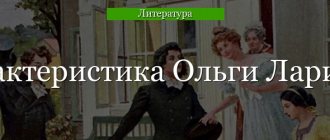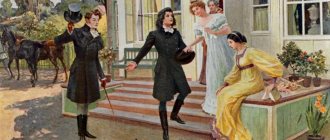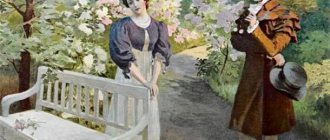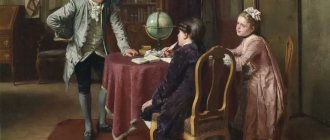Trying to improve relations with Tatyana, Onegin receives a rebuff. This upset the main character even more. As a result, all these incidents greatly influenced the development of the protagonist’s personality. This made him a strong and confident man who began to understand his feelings well and began to understand what true love and friendship are. From a secular slob, Onegin turned into a responsible young man who could be safely relied on in any matter. The author wrote the novel itself over eight years. And throughout the novel, you can perfectly see the development of Onegin from adolescence to a self-confident man. Likewise, in the novel you can feel the one-sided love of girls who, in the first steps of their lives, make mistakes in choosing their ideal for life. But, despite this, time puts everything in its place and changes people to suit its conditions. It is life that teaches people to correct mistakes that are made at a young age.
Essay about Evgeny Onegin
Pushkin wrote his Eugene Onegin from young people living in the early 19th century. Secular lions, or rather lion cubs, aristocrats. So they frolic and have fun for their own pleasure. Their favorite pastime is to do nothing, dance at balls, attend theaters, although they could very well make a dizzying career. The family lived in abundance. Little Onegin had a nanny, then a French tutor. The teachers didn’t particularly bother with science, but they taught me everything so as not to disgrace myself in the world. He did not lift anything heavier than a hand, groomed and cherished his hands, was diligently lazy and engaged in useless small talk. I didn’t like to read and didn’t want to, so I started to write something, but I also gave up. After all, writing is a titanic work if you do it seriously. Just like a woman, he moped, got bored, flattered, flirted, pretended to be in love. So he “wasted” his life in the capital. “He lives without a goal, without work” - this is how Pushkin characterizes Onegin. The village quickly tired of Evgeniy. He didn't know what to do, what to do. It was enough for him to be happy and touched by nature for a couple of days. There was no one here to chat and make eyes. The peasants worked from dawn to dusk. Onegin's only merit is that he replaced work with a cash tax. He doesn’t know how to manage a household and doesn’t want to learn. And he returned to his usual occupation - doing nothing, being lazy. He imagined himself to be a hero, decided that he was superior to everyone around him and that he could despise them. “We regard everyone as zeros and ourselves as ones, we all look at Napoleons...” This is how Pushkin sees Onegin. His neighbors thought he was strange, he avoided them - he ran away from them through the back porch of the house. But something like a friendship began with Lensky. But it turned out to be unreal and short-lived. The young people, who cannot compromise, quarreled. And the matter ended with a duel and the death of Lensky. A beautiful young girl fell in love with him, but he rejected her love. Hanging around the world without a goal or purpose, fortunately there is plenty of money. True, he begins to think about his worthless, empty life. Having met Tatyana for the second time in the capital, he suddenly woke up and was inflamed with love for her. But she rejected him - she is married. Marriage is sacred to her. The great critic Belinsky gave a clear definition to people like Onegin as “suffering egoists.” Some young people in our time imagine themselves to be Napoleons; other people are nothing to them; they waste their lives aimlessly, squander their parents’ money, rush through the streets in expensive cars, and violate traffic rules. Only, as you know, for every Napoleon there is a Kutuzov.
Essay 4
The novel “Eugene Onegin” can rightfully be considered a masterpiece of Russian literature; A.S. Pushkin created incredible images in his work. One of the central and main ones was the image of the main character. At the very beginning of the novel, we learn that Eugene was raised French and, accordingly, received a French education. He knows economics, knows how to behave during a conversation, knows a lot about fashion, takes care of himself, is pedantic, and spends a lot of time in front of the mirror. Onegin’s views on life did not coincide with his father, since his son’s were more modern and philosophical. Evgeniy is smart, he speaks French and Latin well, and knows how to dance the mazurka. He has a lot of foreign things in his office; he is alien to Russian society. In the theater, the hero pays attention to young actresses, goes to balls only to look at women and their legs, in general, he had a frivolous attitude towards the weaker sex. Onegin is not keen on metropolitan life, since he is more attracted to everything foreign. He is smart, with his own dreams and goals, but he is a person who is not able to act, work, or trust people. He is disappointed in everything, the blues have taken possession of him, but there is still hope for a change in life, a desire to change places appears. In the village, Evgeniy is bored at first, reads books, replaces corvée with quitrent, and does not find a common language with his neighbors, since he is smarter and more educated. There he meets Lensky, they become friends “out of nothing to do.” They are attracted to each other's foreign upbringing, but are otherwise completely different. This is a fragile friendship that is doomed to collapse. Subsequently, the friends meet in a duel, where Lensky dies. After meeting Tatyana, the girl falls in love with Onegin, since for her he is the hero of a French novel, an ideal, but does not receive reciprocity in response to her love letter, since Eugene feels his unpreparedness and spiritual poverty. He honestly tells the girl about his negative traits and uncertainty about the effectiveness of their marriage. A few years later, the main character meets Larina at one of the balls and realizes that he loves her, but it turns out to be too late: Tatyana is married and is not going to leave her husband. So, Onegin understands that he has missed his happiness. In his novel, Pushkin tried to show the young people of his time, to show the unacceptability of such a way of life, to call on people to change their way of life. 9th grade
Essay-reasoning Eugene Onegin as a typical representative of his time
A. S. Pushkin’s novel “Eugene Onegin” reflects the life of Russian society in the 10-20s of the nineteenth century. This is an era with unclear hopes and aspirations of the intelligentsia, preceding the Decembrist uprising. The author broadly presented Russian reality, moving the action from St. Petersburg to the village, then to Moscow and, finally, again to St. Petersburg, as if closing the circle of his narrative. The poet sought to create a work that would “reflect the century and modern man.”
At the center of the novel is the image of Eugene Onegin, in which the poet wanted to reflect the typical features of nobles and St. Petersburg aristocrats. In the first chapter, the author talks in detail about the origin, upbringing and lifestyle of the title character, introducing him to his readers as a “good friend”, talking in detail about his friendship with Eugene, about common walks and conversations.
Meanwhile, the author's tone is imbued with slight irony when he talks about his hero.
Onegin was “born on the banks of the Neva.” We know nothing about Eugene’s mother, but about his father it is reported that he “gave three balls every year and finally squandered it.” The father entrusted the upbringing of his son to foreigners. The French tutors taught the boy “everything in jest”, did not bother him with “strict morality” and took him for a walk in the Summer Garden. But “when the time came for Onegin’s rebellious youth,” he, having appeared in the highest society of St. Petersburg, was well received in society, since he possessed all the qualities that are considered necessary in an aristocratic environment. This is the so-called set of comme il faut, a “decent person”: the ability to speak French perfectly, dance the mazurka easily, bow naturally. Are you enrolling in 2021? Our team will help you save your time and nerves: we will select directions and universities (according to your preferences and expert recommendations); we will fill out applications (all you have to do is sign); we will submit applications to Russian universities (online, by e-mail, by courier); we will monitor competition lists ( we will automate the tracking and analysis of your positions); we will tell you when and where to submit the original (we will evaluate the chances and determine the best option). Entrust the routine to professionals - more details.
Onegin’s knowledge is amateurish, he learned “a little something and somehow,” but surpassed himself in the “science of tender passion,” that is, he knew how to play a love game with a lady in order to get a “secret date” from her.
The author describes in detail Onegin's day, just one of all the days of his eight-year stay in secular Petersburg, since they were all similar to one another. Waking up late, notes are brought to bed with invitations to social evenings, balls, children's parties. But while wearing a fashionable bolivar (wide-brimmed hat), the hero goes for a morning walk to the boulevard, as Nevsky Prospekt was called at that time. The poet does not skimp on details that emphasize that the hero follows fashion, for example, Onegin has an expensive watch with a ringing sound - a Breguet. At the restaurant, Kaverin, Pushkin’s friend, is waiting for Onegin for sumptuous dishes. Evgeniy's life is scheduled minute by minute, and at first glance it seems that he has no time to be bored. The “waking Breguet” with its ringing reminds us that it’s time to go to the ballet of the fashionable choreographer Didelot. But Onegin is bored at the theater. Then the hero goes home and spends three hours in front of the mirrors in order to look perfect at the ball and not cause “jealous condemnation” from the world.
Onegin does not feel happy. Spending his life in secular entertainment, he is susceptible to the moral “disease of the century” - “Russian blues”, or in other words “English spleen”. The disillusioned hero, whom the author compares to Childe Harold, the romantic character of Byron's poem, is trying to overcome a spiritual crisis. What attempts is he making to achieve this? Leaving the world and secular beauties, Onegin first took up his pen, but since “he was sick of persistent work,” nothing came of it. Then he took up reading books, wanting to appropriate “someone else’s mind” for himself, but he saw no point in reading either.
Onegin and the author were already planning a trip to distant lands, but Eugene was summoned to the village to receive an inheritance, since his uncle was dying. Life in the village seemed new to Onegin only for two days; on the third, boredom began to haunt him again. In the village, he became friends with the young romantic poet and idealist Vladimir Lensky, who was educated in Germany at the famous University of Göttingen and, with the help of his friend, just out of curiosity to see the object of his friend’s dreams, Olga, visited the Larin family. At first glance, Onegin noted Tatyana’s unusualness, sadness and thoughtfulness and was surprised that the poet Lensky preferred the ordinary, ordinary Olga.
What role did love play in Onegin's life? In fact, he did not know real and deep feelings. In secular Petersburg it was just a game, flirting, and nothing more. Having received Tatyana’s letter with a declaration of love, Onegin was vividly touched by the sincerity of the girl’s feelings, the “old zeal” even awoke in him for a moment, but his disappointed soul was empty, he was unable to renew it. Therefore, his explanation with Tatyana is a confession, where he honestly and nobly admitted why he could not respond to the feelings of the rural young lady.
After the tragic events (Onegin’s murder of his friend Lensky in a duel), the hero reappears three years later in St. Petersburg and meets the already married Tatyana there in the world, amazed at “how Tatyana has changed,” how she entered into the role of a society lady, important, cold, majestic and at the same time royally noble. Is Onegin in love with Tatiana? On the one hand, the author is ironic when he says that all people are like “the ancestor Eva”: give them the “forbidden fruit”. Onegin fell in love with Tatyana when she was married to a general and close to the royal court. In an explanation for Onegin’s letter with a confession, Tatyana reproaches him that he has become a “slave of petty feelings,” that is, a “slave” of pride and vanity. But at the same time, the author shows how Onegin suffers from unrequited love or passion, begins to turn pale and wither. Has there been a moral revival of Eugene Onegin? The author leaves his hero “in an evil moment” when Tatyana admits that she loves him, but will be faithful to her husband forever. Onegin stands “as if struck by thunder,” perhaps because Tatyana taught him a moral lesson: it turns out that you can sacrifice your happiness for the sake of another.
Undoubtedly, Onegin is a typical representative of his time, in which the era is reflected; he is a type of superfluous person who has not found himself and his purpose in life. The main traits of his character are disappointment, selfishness, lack of the habit of hard work as a result of improper upbringing. But he also has positive qualities: intelligence, nobility.
Useful material on the topic:
- How do Onegin and the St. Petersburg world appear in A. S. Pushkin’s novel “Eugene Onegin”?
- As revealed in the novel by A.S. Pushkin Evgeny Onegin Russian soul of Tatiana?
- How is the problem of unrealized personal potential revealed in A. S. Pushkin’s novel “Eugene Onegin”?
- Why were two extraordinary personalities - Onegin and Tatyana - unable to find happiness in love? (Based on the novel by A.S. Pushkin Evgeny Onegin)
- Why did such extraordinary personalities as Evgeny Onegin and Tatyana Larina not find happiness in love?





